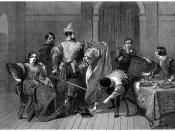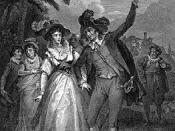William Shakespeare's comedies always ended with a marriage. In fact, whether there was a marriage at the end or not alone determined whether the play was a comedy. In each of the three comedies written by Shakespeare, Taming of the Shrew, Much Ado about Nothing, and Measure for Measure, there was a very strong female character. However, by the end of the play, the three females conformed to society's norms to achieve a "happy ending". Furthermore, not only did they conform to the norms of their day, but it was a male whom with they fell in love with that changed their ways.
Katharine's character at the beginning of the play, The Taming of the Shrew, is loud, bossy, and takes orders from no one. She is jealous of her younger sister, Bianca, because Bianca is sweet, pretty, and what every man wants.
Katharine: What, will you not suffer me? Nay, now I see She is your treasure, she must have a husband, I must dance barefoot on her wedding day And, for you love to her, lead apes in hell.
Talk not to me. I will go sit and weep Till I can find occasion of revenge. (Shakespeare, 75) She is the female that nobody wants. All the men talk about sweet Bianca that is so unlike her sister, who is known as a shrew in the whole town.
Lerman 02
Most of the people in the town of Padua have lost hope for Katharine, and think that no man will submit to marrying her, even for her money. The women of society in the day that this play was written were supposed to bow to men, clean their feet, and are obedient. The more obedient a wife is the better. If women did not act in...


